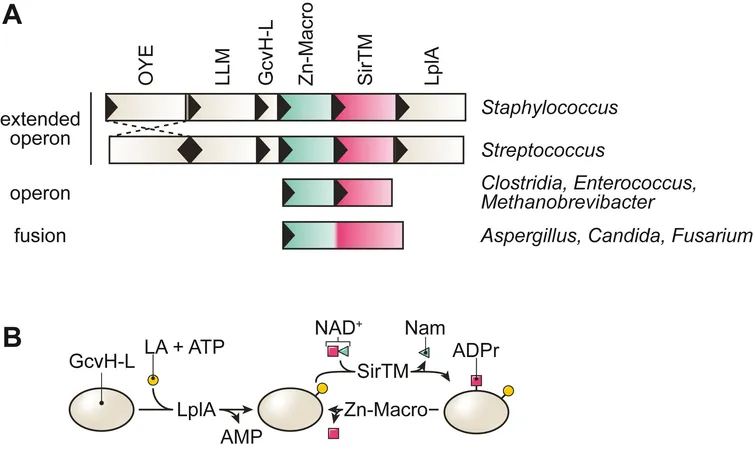
Breakthrough Discovery in Antimicrobial Defense: Scientists Unlock New Pathways to Combat Drug-Resistant Infections!
2024-10-29
Author: Sarah
In a remarkable advancement for global health, researchers have unveiled a crucial mechanism that enables certain pathogens to elude the human immune system. This groundbreaking study, spearheaded by scientists from the University of Sheffield alongside teams from various institutions across the UK, the Netherlands, and China, delves into the functions of a unique group of enzymes called zinc-dependent macrodomains (Zn-Macros). These enzymes play a pivotal role in reversing a cellular process known as ADP-ribosylation, a discovery that could signal a new era in antimicrobial treatments.
ADP-ribosylation is a reversible modification your body's proteins and DNA undergo, playing a critical role in how cells respond to stressors, including DNA damage and infections. While this process has been extensively studied in higher organisms, scientists are now shedding light on its implications in microorganisms, where it governs immune responses and the mechanisms by which these pathogens evade destruction.
Utilizing a blend of phylogenetic, biochemical, and structural techniques, the research team meticulously analyzed the functions of Zn-Macros, which are prevalent in various pathogenic microbes. These enzymes not only facilitate the removal of harmful ADP-ribosyl modifications but also enhance the pathogens' survival during oxidative stress—a condition that arises from damaging reactive molecules produced by immune responses.
Crucially, the study identified that the enzymatic activity of Zn-Macros is dependent on the presence of zinc ions in their active sites. Furthermore, unique structural features of these enzymes were discovered, which have significant implications for the development of novel therapeutic strategies targeting these microbial defenses.
Given the relentless rise of antimicrobial resistance globally, understanding these pathways is more important than ever. The World Health Organization underscores the urgency of this situation, having published prioritized lists of pathogens that pose severe threats to human health. The findings from this research suggest that targeting the Zn-Macro pathway could significantly diminish the virulence of notorious pathogens like Staphylococcus aureus and Streptococcus pyogenes.
These bacteria utilize complex interactions between lipoic acid metabolism and ADP-ribosylation signaling to establish their protective mechanisms. By disrupting this crosstalk, healthcare providers could potentially increase the efficacy of existing treatments and pave the way for innovative therapeutic options to combat these stubborn infections.
As researchers continue to explore the implications of Zn-Macros in immune evasion, this study represents an exciting leap forward in the fight against antimicrobial resistance. The potential to exploit these findings could lead to new drugs that target critical processes in infections where ADP-ribosylation is a game-changer.
“This research not only unveils the evolutionary and molecular underpinnings of ADP-ribosylation reversal by Zn-Macros, but it also opens new avenues for drug development in diseases where this process is crucial,” said a lead researcher. With antimicrobial resistance on the rise, the urgency for such innovations has never been more pressing. Let's hope this breakthrough leads to protecting public health worldwide.





 Brasil (PT)
Brasil (PT)
 Canada (EN)
Canada (EN)
 Chile (ES)
Chile (ES)
 España (ES)
España (ES)
 France (FR)
France (FR)
 Hong Kong (EN)
Hong Kong (EN)
 Italia (IT)
Italia (IT)
 日本 (JA)
日本 (JA)
 Magyarország (HU)
Magyarország (HU)
 Norge (NO)
Norge (NO)
 Polska (PL)
Polska (PL)
 Schweiz (DE)
Schweiz (DE)
 Singapore (EN)
Singapore (EN)
 Sverige (SV)
Sverige (SV)
 Suomi (FI)
Suomi (FI)
 Türkiye (TR)
Türkiye (TR)